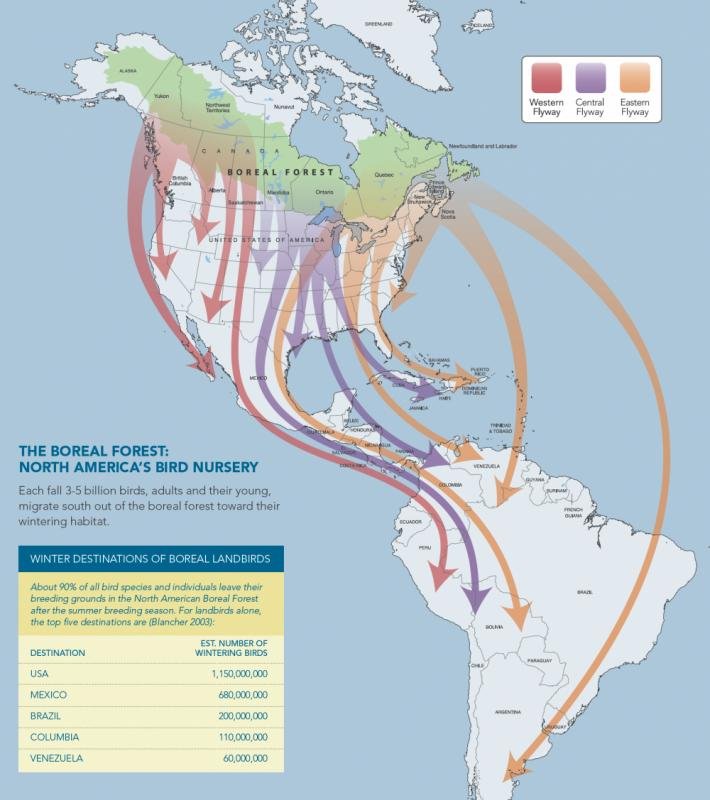Bird Populations Are On the Decline Across North America - Will You Take the Year of Helping Birds Challenge?
Month by Month, Actions You Can Take to Help Birds Repopulate and Thrive
Coffee, burgers, toilet paper - they don’t seem like they have anything to do with birds, but they do: they all require land to grow, and so do birds! This month we’re going to explain how these common products are produced and how their production often hurts birds. Most importantly, we’re going to give you bird-friendly alternatives. As a consumer you can choose products that reduce or eliminate the destruction of bird habitat. Challenge yourself this month to make your purchasing habits more bird-friendly!
Imagine traveling home after a long absence, and your home is no longer there; it’s been destroyed, and in its place is nothing recognizable. There’s nowhere to get food or find shelter. You’re in shock, and wander around, looking for some semblance of nourishment or a place to rest after your long trip, but there’s nothing for miles. This sad scenario – habitat loss due to human encroachment - has been the experience for many birds in the past 50 years. It is one of the biggest reasons why birds have suffered devastating population declines in North America. There are nearly 30% fewer birds now than there were in the 1970s, or a loss of about 3 billion birds in 50 years, according to the Cornell Lab of Ornithology.
A junco may travel from Chicago to its breeding grounds in Canada to find its habitat destroyed by forest clear cutting for paper products. An oriole may travel to its winter feeding area in South America to discover the tropical forest destroyed and replaced with a palm oil or coffee plantation, or a livestock ranch. Human population growth and its constant need for food and paper, along with the accompanying human desire to make more money, is threatening birds by destroying their homes and food. Human encroachment of bird habitat is reaching a critical point for bird populations, but sometimes human use of land can be done in ways that minimize or improve bird habitat. You can purchase products that are produced in a more bird-friendly way, or avoid products that are not. If you change some of your purchasing habits, you can actually help birds! Let’s get started with 3 popular products that most people buy regularly that are affecting North America bird populations.
This map shows the wide range of habitat of many North American birds, from Canada’s boreal forest to Amazon rainforests in South America. From Borealbirds.org.
Source: Borealbirds.org
The Coffee Challenge: Buy coffee that protects bird habitat.
Did you know that over 500 billion cups of coffee are poured every year? Coffee is derived from coffee beans, which are grown in tropical forests all over the world, including Central and South America, where many North American birds migrate in the winter. In fact, Brazil is the single largest coffee grower in the world by far. For centuries, coffee has been cultivated in the shady understory of rainforests, but this changed in the past fifty years when coffee growers learned that they could make much more money by planting coffee in sunny locations, where the yield is much higher. Coffee growers began to clear-cut forests, growing coffee in large sunny plantations, often illegally, and this practice continues today. It’s estimated that 75% of the world's coffee is farmed without regard for birds, reducing important and unique bird habitat.
It doesn’t have to be that way, and many coffee growers have shifted back to the traditional shade-grown farming methods, which preserve bird habitat. According to the Smithsonian Zoo, shade-grown coffee has been proven to be better for birds, providing improved bird habitat and increased numbers of birds and numbers of bird species.
How do you know if the coffee you drink supports birds? The Audubon Society provides an overview of how to know which coffees are best for birds. The Smithsonian Institute developed Bird Friendly ® certification so that consumers can be sure that the coffee (and cocoa) they drink protects bird habitat. Here is a guide to where you can buy Bird Friendly ® certified coffee, either online or at a local retail store (Whole Foods is the main place to purchase in the Chicago area.)
Some merchants - such as Trader Joe’s - offer shade-grown coffee that is not officially designated, but still is likely more beneficial that non-shade-grown coffee.
The Rain Forest Alliance has less strict guidelines than Smithsonian, but uses their frog logo to identify coffee and other products that meet their standards for maintaining bird habitat. Here’s a list of retailers that meet their standards. Here’s a great article on why Bird-Friendly coffee is so important.
The Toilet Paper Challenge: Buy recycled or renewable toilet paper
Another surprising everyday item whose production seriously affects bird habitat is toilet paper. Americans are the largest consumers of toilet paper, using an average of 141 rolls of toilet paper each per year. Where does that paper come from? Much of it comes from Canada’s boreal forest, thee largest intact forest in North America, stretching from Alaska to Labrador, Canada, North America’s “bird nursery”. According to BorealBirds.org, 80% of North American waterfowl, 63% of finches, and 53% of warbler species breed in the boreal. Sadly, NRDC reports one million acres of boreal forests are cleared every year to make toilet paper, reducing bird habitat for paper that is simply flushed after one use.
When you make the switch to toilet paper that is 100% recycled or renewable, you’re doing your part to stop this unnecessary destruction. NRDC provides new ratings and recommends specific brands (PDF): 365 (Whole Foods), Seventh Generation, Trader Joe's and Who Gives a Crap all produce and sell high quality toilet paper that doesn’t destroy critical bird habitat. Stay away from any labeled “super soft”. Don’t buy brands like Charmin, Cottonelle, Kirkland, Scott and Soft and Strong, which by contrast, get an 'F' on the NRDC scorecard. New York Magazine has also rated bidet attachments to add to toilets and eliminate the need for toilet paper.
Try it! You’ll feel so much happier helping birds with this simple purchase switch. I recently started a toilet paper subscription from Who Gives a Crap - it’s so easy to get bird-friendly TP delivered, and as an added bonus, they build toilets in poor communities which helps improve water quality for humans.
The Beef Challenge: reduce your consumption of beef
We all love to see the beautiful birds of spring migration as they fill our yards and local forest preserves with their amazing colors and cheerful songs. We think of them as “our birds”, but many forest songbirds such as Indigo Buntings, Scarlet Tanagers and Tennessee Warblers spend more than two-thirds of their lives in their winter homes in Central and South America. In the last fifty years, these winter homes have been diminished or destroyed outright with forest clear-cutting for cattle.
Simply said, the cattle industry is destroying the rainforest, as forests are clear cut or burned and replaced with cattle farms. So far, 17% of the Amazon rainforest has been destroyed for agriculture, and the trend is getting worse.
As with coffee, Brazil is the largest exporter of beef in the world - and the U.S. is its 2nd largest customer, with the beef often ending up as cheap ground beef in grocery stores like Jewel, Food4Less/Krogers and Safeway.
The average American eats 1 pound (3- 4 hamburgers) a week. If you're a burger lover, could you cut back on your burger habit for the birds? Any reduction of beef consumption helps reduce the deforestation of many birds’ winter homes. Changing food habits is hard, but there are many new and improved plant-based beef options that even carnivores agree taste delicious! Try Beyond Beef burgers, meatballs or Italian sausage, or any of the other plant-based brands you can find at grocery stores. Even Chicago’s venerable Italian Beef has a plant-based alternative at Buona Beef (also available in the frozen section of Jewel and Whole Foods). For delicious home-cooked comfort food, explore vegetarian and vegan blogs like Nora Cooks.
The Palm Oil Challenge: Buy products that use certified sustainably grown palm oil
Ok, so I said there were 3 main products affecting North American birds, but I’m also going to mention palm oil. Palm oil is used in almost every type of product imaginable, including make-up, cleaning products and food, and it is responsible for dramatic deforestation and wildlife habitat loss. Currently about 85% of all palm oil is grown in Indonesia and Malaysia, with Latin America at about 6%, and Africa 4%. Production of palm oil is expected to grow substantially because it is an easy and cheap crop to produce compared to other food-safe oils such as soybean and sunflower oil, and so its impact on North American birds will increase.
You can’t avoid palm oil, but you can buy palm oil that is grown sustainably. The Roundtable on Sustainably Grown Palm Oil (RSPO) has developed standards for producing and sourcing certified sustainable palm oil. They work with all levels of the palm oil supply chain, and provide a searchable directory of members who are certified. You can also use the PalmOilScan app as you’re shopping to determine a brand’s palm oil: Google Play and Apple’s App Store.
As Consumers We Have Power!
With less than 5% of the world’s population, Americans consume a lot: we consume more coffee than any other country in the world, we consume more beef than any other country in the world, and we consume more toilet paper than any other country in the world (we’re #9 for palm oil). All of these products destroy bird habitat, thus contributing to overall bird population losses.
As individuals, we each have the power to choose the products we purchase. The types of products we choose are a powerful tool to protect habitat for birds. Use your spending power wisely for the birds - switch to recycled toilet paper, eat one less burger a week, buy bird-friendly coffee, and check your palm oil products - it all helps the birds!
Learn More
Migratory Boreal Birds - Borealbirds.org
How to Choose a Bird Friendly Coffee - The Audubon Society
Where to Buy Bird Friendly Coffee - The Smithsonian National Zoo
The View from Northern Nicaragua’s Highlands: Saving Birds with Coffee - The American Bird Conservancy
5 Reasons to Drink Bird Friendly Coffee - Birdwatching HQ
Toilet Paper Is Driving the Climate Crisis with Every Flush - NRDC
Who Gives a Crap - Recycled Toilet Paper Delivery
The Amazon’s Blazing Fires are Squeezing Habitat for Imperiled Birds - The Audubon Society
How American’s Love of Beef is Killing the Amazon Rainforest - The Washington Post
Palm Oil The World’s Most Popular Oil - World Wildlife Fund
PalmOilScan app Google Play and Apple’s App Store.
Related Chicago Audubon blog posts
Subscribe to the Chicago Audubon newsletter (link below) to ensure you don’t miss my monthly ideas, and follow CAS on social media.












